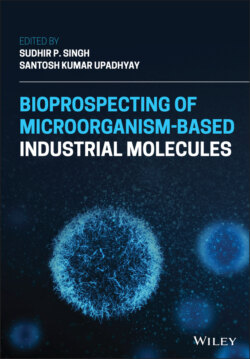Читать книгу Bioprospecting of Microorganism-Based Industrial Molecules - Группа авторов - Страница 73
4.4.4.1 Carbohydrates from Algae
ОглавлениеAlgae are very well known to produce a wide array of polysaccharides. These polysaccharides play a crucial role in imparting the structure of cell walls and act as energy storage units during unfavorable stressful conditions. Some of the major types of biologically active polysaccharides in algal tissues are fucoidan, lamnarian, alginates, agar, carrageenan, galactan, porphyran, glucan, and ulvan, which demonstrate typical structural and functional characteristics [84]. These polysaccharides are nontoxic, cost‐effective, easily extracted, and abundant in the algal biomass, which can be used as a substitute against synthetically derived gelling agents, or silicone‐derived ingredients. These compounds provide moisturizing and have antioxidant properties; hence they are used as gelling agents and stabilizers in emulsions [85, 86] (Table 4.2).
Table 4.2 Algal biomolecules, sources, origins, and applications in cosmetics.
Source: Wang et al. [85] and Wang et al. [86].
| Group of compound | Active compound | Algal species | Cosmetic properties | References |
|---|---|---|---|---|
| Polysaccharides | Agar | Gelidium sp.Gracilaria sp. | Emulsion stabilizers, gelling agents, thickeners | [87–89] |
| Alginates | Laminaria sp.Lessonia sp.Macrocystis sp. | Emulsion stabilizers, chelating agents, gelling, moisturizing, photo‐protective | [8490–92] | |
| Fucoidan | Saccharina sculpera Fucus vesiculosus, Turbinariaconoides, Undaria pinnatifida | Antiaging, anti‐wrinkle, antioxidative properties, UV protectant, skin lightening, spot reduction, elastase, tyrosinase inhibitors, skin fibroblast stimulation | [93–97] | |
| Laminarans | Laminaria japonica, Ecklonia kurome, Eiseniabicyclis, Saccharina, Ascophyllum, Fucus, Sargassum, and Undaria | Antioxidant, anti‐cellulite agent | [81, 98, 99] | |
| Porphyran | Porphyra sp. | Antioxidant and antiaging | [78, 88, 93, 100] | |
| Carrageenan | Acanthophora muscoidesChondrus crispus | Gelling agents, protective colloids, thickeners | [101–103] | |
| Ulvan | Ulva armoricana, Ulva lactuca, Ulva rotundata, and Ulva rigida | Antioxidative, chelating, gelling, moisturizing, and protective agents | [88, 104, 105] | |
| Pigments | Astaxanthin | Haematococcus pluvialis | Antiaging | [106] |
| β‐carotene | Chlorella, Spirulina, Dunaliella salina | Antiaging, antioxidant, radical scavengers, anti‐photoaging agents, and colorants | [88107–111] | |
| Chlorophylls(a, b, c, d) | Chlorella, Nannochloropsis | Coloring agents, UV‐protectant, reduce inflammation, Reducing wrinkles, inhibiting matrix metalloproteinases (MMPs) | [88, 92,112–114] | |
| Fucoxanthin | Fucus, Dictyota, Saragassum, and Laminaria | Anti‐tyrosinase activity in guinea pig UVB irradiated, and melanogenesis in mice UVB irradiated | [88115–117] | |
| Phycobiliproteins(APC, PE, PC) | Cyanobacteria | Antioxidant, anti‐inflammatory, colorants, radical scavenging agents | [88, 97,118–121] | |
| Secondary metabolites | Phlorotannins | Ecklonia cava, Eiseniabicyclis | Tyrosinase and hyaluronidase inhibitors, antioxidants, antiaging, UV‐photoprotectant, chelating agents | [79, 88, 122] |
| Mycosporine‐like amino acids (MAAs) | Scytonemin, Asterina‐330, Shinorine, PalythinePorphyra‐334 | Scytonema, Lyngbya, Porphyra umbilicalis | Photo‐protectant, sunscreen against UV‐A | [79, 111,122–124] |
